

Board Observers Weekly - June 10th, 2014. Vinod-Khosla-2014.5.20 Pitch-the-Way-VCs-think KVSummit alt. A Dozen Things I’ve Learned from Michael Moritz About Venture Capital. I was introduced to Michael Mortiz only once many years ago during a visit to Sequoia.
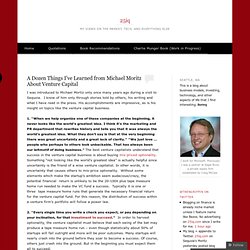
I know of him only through stories told by others, his writing and what I have read in the press. His accomplishments are impressive, as is his insight on topics like the venture capital business. 1. “When we help organize one of these companies at the beginning, it never looks like the world’s greatest idea.
I think it’s the marketing and PR department that rewrites history and tells you that it was always the world’s greatest idea. Some Thoughts on iOS8. I’ve taken most of this week to digest all that Apple said and showed off at WWDC.
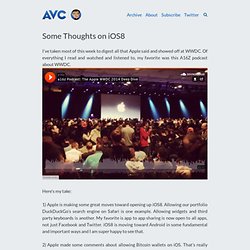
Of everything I read and watched and listened to, my favorite was this A16Z podcast about WWDC. Here’s my take: 1) Apple is making some great moves toward opening up iOS8. Allowing our portfolio DuckDuckGo’s search engine on Safari is one example. Allowing widgets and third party keyboards is another. 2) Apple made some comments about allowing Bitcoin wallets on iOS. 3) Apple is bringing the cloud more front and center in iOS8. For Google, devices are dumb glass and the intelligence is in the cloud, but for Apple the cloud is just dumb storage and the device is the place for intelligence. Why Uber is Worth $18.2 Billion. A Disruptive Cab Ride to Riches: The Uber Payoff. If you are old enough to remember market fevers from past booms, you are probably inclined to dismiss both the claims and the valuations as fantasy.
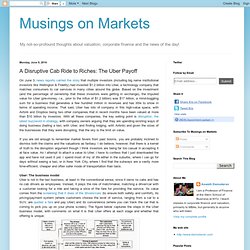
I do believe, however, that there is a kernel of truth to the disruption argument though I think investors are being far too casual in accepting it at face value. As I attempt to attach a value to Uber, I have to confess that I just downloaded the app and have not used it yet. I spend most of my of life either in the suburbs, where I can go for days without seeing a taxi, or in New York City, where I find that the subways are a vastly more time-efficient, cheaper and often safer mode of transportation than taxis. Uber has been able to grow at exponential rates since its founding in 2009 by Garrett Camp and Travis Kalanick, with the latter (who is new CEO) claiming that it is doubling its size every six months.
The taxi and limo market currently is dominated by small, local players and is regulated in most cities. Class 9 Notes Essay. Peter Thiel’s CS183: Startup - Class 9 Notes Essay Here is an essay version of my class notes from Class 9 of CS183: Startup.
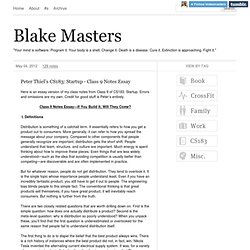
Errors and omissions are my own. Credit for good stuff is Peter’s entirely. Class 9 Notes Essay—If You Build It, Will They Come? I. Distribution is something of a catchall term. But for whatever reason, people do not get distribution. There are two closely related questions that are worth drilling down on. The first thing to do is to dispel the belief that the best product always wins. II. Before getting more abstract, it’s important to get a quantitative handle on distribution. Customer lifetime value, or CLVAverage revenue per user (per month), or ARPURetention rate (monthly, decay function), or rAverage customer lifetime, which is 1 / (1-r)Cost per customer acquisition, or CPA CLV equals the product of ARPU, gross margin, and average customer lifetime.
On a Mission. One of the interesting things I have seen, especially in the last 10 years, is that many of the big winners in technology have been what I call “mission-driven” versus “mercenary-driven” companies.
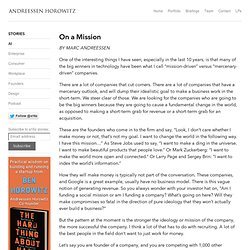
There are a lot of companies that cut corners. There are a lot of companies that have a mercenary outlook, and will dump their idealistic goal to make a business work in the short-term. We steer clear of those. We are looking for the companies who are going to be the big winners because they are going to cause a fundamental change in the world, as opposed to making a short-term grab for revenue or a short-term grab for an acquisition. These are the founders who come in to the firm and say, “Look, I don’t care whether I make money or not, that’s not my goal. How they will make money is typically not part of the conversation. But the pattern at the moment is the stronger the ideology or mission of the company, the more successful the company.
The Pmarca Guide to Career Planning, part 2: Skills and education. [Please read my opening disclaimers.
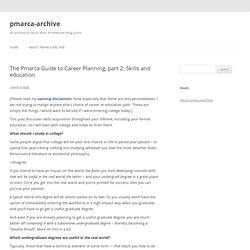
Note especially that these are only personalviews; I am not trying to malign anyone else's choice of career or education path. These are simply the things I would want to be told if I were entering college today.] This post discusses skills acquisition throughout your lifetime, including your formal education. So I will start with college and move on from there. What should I study in college? Some people argue that college will be your one chance in life to pursue your passion – to spend four years doing nothing but studying whatever you love the most, whether that’s Renaissance literature or existential philosophy. I disagree. If you intend to have an impact on the world, the faster you start developing concrete skills that will be useful in the real world, the better – and your undergrad degree is a great place to start. A typical liberal arts degree will be almost useless on its own.